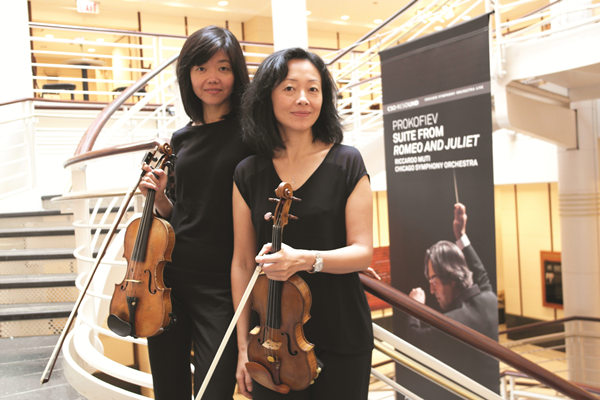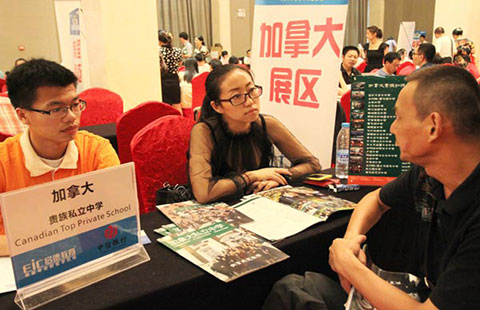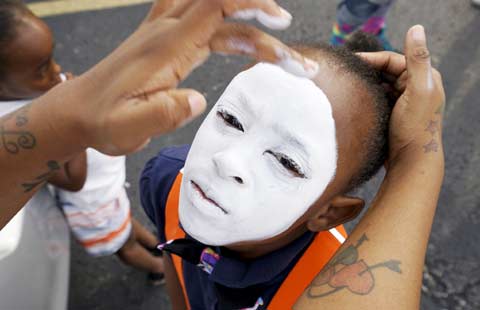Chinese musicians play at the top
Updated: 2015-08-14 04:11
By JIAN PING in Chicago(China Daily Canada)
|
||||||||
 |
|
Sisters Qing Hou (left) and Lei Hou at the Chicago Symphony Orchestra’s hall say they used to play in separate orchestras but now enjoy being together. JIAN PING / For china daily |
At full complement, the Chicago Symphony Orchestra, boasts 109 musicians from all over the world, and more than a dozen are Chinese.
Li-Kuo Chang, assistant principal viola, joined the CSO in 1988, becoming the first musician from the Chinese mainland to join the legendary ensemble.
“CSO is so world famous. It’s the ultimate achievement of our profession,” said Chang. “I applied for a CSO audition three times but canceled the first two at the last minute. I was so scared,” he added with a laugh.
Encouraged by a musician from CSO whom he met at a music festival, Chang showed up at the audition the third time.
He made it through the competitive process and was selected.
“It was the proudest moment of my life,” he said.
Chang studied at the Shanghai Conservatory of Music. In 1979, he received a full scholarship to the Eastman School of Music in Rochester, New York, becoming one of the first Chinese going abroad to study after relations between the US and China were normalized.
Also making history at the CSO are two Chinese sisters, Lei Hou and Qing Hou, both violinists, who auditioned for two openings in 1997 and were both accepted.
“There were more than 200 applicants for the two positions that year,” Qing, 46, the younger of the two, said. “We were so fortunate. It felt like winning the lottery.”
Both sisters started learning to play violin in early childhood and had studied under great teachers both in China and the US by the time they came to the audition.
Qing said she admired her older sister as a child and wanted to follow in her footsteps.
Lei said she wanted to be a ballerina when she was a child, but her mother insisted she study the violin because it would mean a much longer career.
“I was seven, and we were living in Lan Zhou where there was no violin,” Lei said. “Actually, I had never even seen a violin.”
Her mother, a cello player, and her father, a dancer-turned-conductor, were not deterred. They made a violin for her.
Lei attended the Shanghai Conservatory of Music and was selected to attend Peabody Conservatory of Music by Berl Senofsky when he went to Shanghai to give master classes. Lei obtained her bachelor’s and master’s in violin performance on full scholarship.
Qing went to the Central Conservatory of Music in Beijing and later joined Lei at the Peabody. She earned her master’s at the New England Conservatory.
The sisters were playing in two different orchestras after graduation — Lei was with the National Symphony in Washington, DC, and Qing, the San Francisco Symphony. Close siblings, they wanted to be together. So when they learned about the two openings at the CSO, they decided to go for it.
For a while, people often mistook one for the other, even their paychecks got mixed up.
Vanessa Moss, CSO vice-president for orchestra and building operations, said that the orchestra only holds auditions when there are openings and they are open to everyone. For string instruments, normally 150 to 200 people apply for one position.
“It’s a very competitive process and the standards are very high,” Moss said. “It’s not just about the best techniques, but also performance and musicianship.”
Other string musicians from the Chinese mainland at CSO include violinists Sando Shia, Ni Mei, Rong-Yan Tang, Yuan-qing Yu and violist Weijing Wang.
Moss said the Chinese musicians were “great citizens of the orchestra.”
“They are all very talented, responsible, and dedicated,” she said.
Violist Chang, 66, who has been with CSO for 27 years, teaches at various institutions, including Northwestern University and the Peabody Institute.
“I very much enjoy seeing my young students succeed,” said Chang.
The Hou sisters formed their “Lincoln String Quartet” shortly after they joined CSO and continue to perform chamber music.
Between their orchestra rehearsals and performances that often amount to four times a week and their chamber music performances, they are busy all the time.
“I love it,” Qing said. “We also love CSO tours. We play at amazing concert halls around the world. Sometimes watching the audiences appreciate the music we are playing brings tears to our eyes.”
CSO toured in China in 2009 and 2013. “It was wonderful going back to China to perform,” said Qing.
Lei said it meant so much seeing her former classmates and teachers in the audience.
CSO will tour China again in January 2016, staging two concerts at the Oriental Art Center in Shanghai and two at the National Center of Performing Arts in Beijing.
Most Viewed
Editor's Picks

|

|

|

|

|

|
Today's Top News
12 firefighters among 44 killed in Tianjin explosions
Hacking blame a US power play: experts
Seattle's tallest building sold
Alibaba falls behind Amazon
Seven killed, 180 injured in N China blast
S. Korean president to visit US in October: White House
Hillary Clinton relents in e-mail inquiry amid campaign
Accusations of Chinese hacking are a US power play, experts say
US Weekly

|

|













